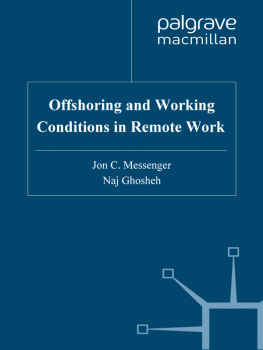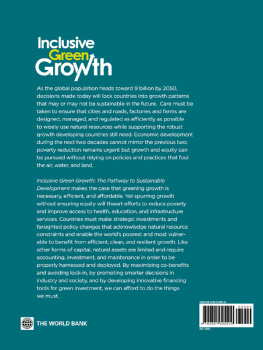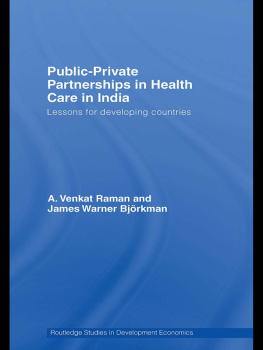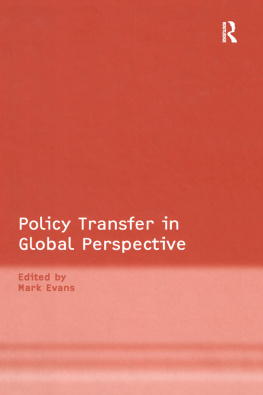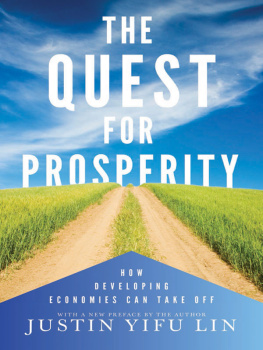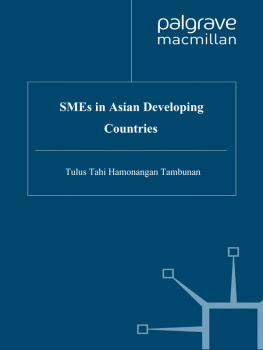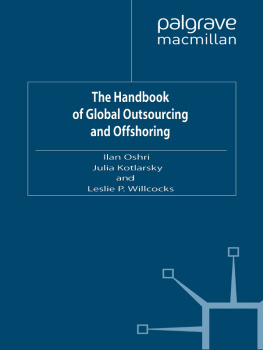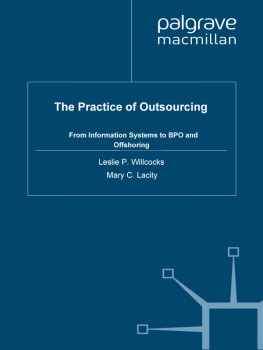Offshoring and Working Conditions in Remote Work
The International Labour Organization
The International Labour Organization was founded in 1919 to promote social justice and, thereby, to contribute to universal and lasting peace. Its tripartite structure is unique among agencies affiliated to the United Nations; the ILOs Governing Body includes representatives of government, and of employers and workers organizations. These three constituencies are active participants in regional and other meetings sponsored by the ILO, as well as in the International Labour Conference a world forum which meets annually to discuss social and labour questions.
Over the years the ILO has issued for adoption by member States a widely respected code of international labour Conventions and Recommendations on freedom of association, employment, social policy, conditions of work, social security, industrial relations and labour administration, among others.
The ILO provides expert advice and technical assistance to member States through a network of offices and multidisciplinary teams in over 40 countries. This assistance takes the form of labour rights and industrial relations counselling, employment promotion, training in small business development, project management, advice on social security, workplace safety and working conditions, the compiling and dissemination of labour statistics, and workers education.
Other recent publications by ILO and Palgrave Macmillan:
BLUNTING NEOLIBERALISM: TRIPARTISM AND ECONOMIC REFORMS IN THE DEVELOPING WORLD (edited by Lydia Fraile)
BUILDING DECENT SOCIETIES: RETHINKING THE ROLE OF SOCIAL SECURITY IN DEVELOPMENT (edited by Peter Townsend)
INTERNATIONAL AND COMPARATIVE LABOUR LAW (by Arturo Bronstein) IN DEFENCE OF LABOUR MARKET INSTITUTIONS: CULTIVATING JUSTICE IN THE DEVELOPING WORLD (edited by Janine Berg and David Kucera)
MICROFINANCE AND PUBLIC POLICY: OUTREACH, PERFORMANCE AND EFFICIENCY (edited by Bernd Balkenhol)
GLOBALIZATION, EMPLOYMENT AND INCOME DISTRIBUTION IN DEVELOPING COUNTRIES (edited by Eddy Lee and Marco Vivarelli)
UNDERSTANDING GLOBALIZATION, EMPLOYMENT AND POVERTY REDUCTION (edited by Eddy Lee and Marco Vivarelli)
Offshoring and Working Conditions in Remote Work
Edited by
Jon C. Messenger
Senior Research Officer, International Labour Office
and
Naj Ghosheh
Research Officer, International Labour Office


International Labour Organization 2010
The designations employed in ILO publications, which are in conformity with United Nations practice, and the presentation of material therein do not imply the expression of any opinion whatsoever on the part of the International Labour Office concerning the legal status of any country, area or territory or of its authorities, or concerning the delimitation of its frontiers.
The responsibility for opinions expressed in signed articles, studies and other contributions rests solely with their authors, and publication does not constitute an endorsement by the International Labour Office of the opinions expressed in them.
Reference to names of firms and commercial products and processes does not imply their endorsement by the International Labour Office, and any failure to mention a particular firm, commercial product or process is not a sign of disapproval.
All rights reserved. No reproduction, copy or transmission of this publication may be made without written permission.
No portion of this publication may be reproduced, copied or transmitted save with written permission or in accordance with the provisions of the Copyright, Designs and Patents Act 1988, or under the terms of any licence permitting limited copying issued by the Copyright Licensing Agency, Saffron House, 6-10 Kirby Street, London EC1N 8TS.
Any person who does any unauthorized act in relation to this publication may be liable to criminal prosecution and civil claims for damages.
The authors have asserted their rights to be identified as the authors of this work in accordance with the Copyright, Designs and Patents Act 1988.
First published 2010 by
PALGRAVE MACMILLAN
Palgrave Macmillan in the UK is an imprint of Macmillan Publishers Limited, registered in England, company number 785998, of Houndmills, Basingstoke, Hampshire RG21 6XS.
Palgrave Macmillan in the US is a division of St Martin's Press LLC, 175 Fifth Avenue, New York, NY 10010.
Palgrave Macmillan is the global academic imprint of the above companies and has companies and representatives throughout the world.
Palgrave and Macmillan are registered trademarks in the United States, the United Kingdom, Europe and other countries.
ISBN13: 9780230248861 hardback
ILO ISBN: 9789221230014
This book is printed on paper suitable for recycling and made from fully managed and sustained forest sources. Logging, pulping and manufacturing processes are expected to conform to the environmental regulations of the country of origin.
A catalogue record for this book is available from the British Library.
A catalog record for this book is available from the Library of Congress.
10 9 8 7 6 5 4 3 2 1
19 18 17 16 15 14 13 12 11 10
Printed and bound in Great Britain by
CPI Antony Rowe, Chippenham and Eastbourne
List of Tables, Charts and Boxes
Tables
Charts
Boxes
Preface
Changes in the nature of work that have been sweeping the globe offer both new opportunities and new challenges and risks for countries, employers, workers and governments. Just as the temporal patterns of paid work have been diversifying, so too have its spatial patterns. The globalization of markets, allied with dramatic advances in information and telecommunications technologies (ICTs) such as broad-banding, now make it increasingly possible to disaggregate a whole range of services into multiple, successive upstreamdownstream stages. The rise of ICTs during the last decade has made it possible for businesses to implement a broad transformation in the geographic distribution of a wide variety of work activities and functions across the world, and, for the first time, to locate the processing of services not requiring direct physical customer interface at a distance from their consumption. Entire services, functions and tasks can now be distributed and carried out concurrently or sequentially in separate locations in different countries where the requisite skills and expertise are available, either through the companys own subsidiaries or purchased from independent (third-party) service providers. These business services can then be delivered electronically from remote locations, where they are processed through the client company or by the third-party service provider and sent directly to the ultimate consumer.
This global sourcing phenomenon can broadly be defined in terms of two components: (1) remote working and (2) the use of ICTs as the essential enabler. Information technology-enabled services (ITES), whether intermediate or entire service processes, can now be sourced remotely from a wide range of locations around the world for delivery to corporate clients or consumers in other parts of the world. This definition not only covers offshoring and outsourcing but also extends to the entire range of choices for sourcing services on a global basis, whether internally or from independent third-party service providers. This trend includes the relocation of service work from higher-cost developed countries to lower-cost developing ones.

